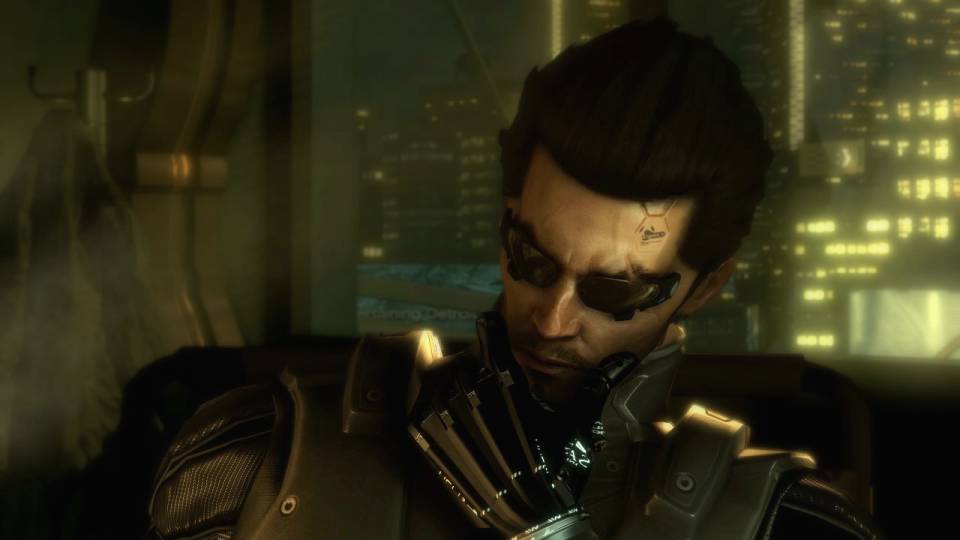
"It's always [a set of] complex feelings when you finish a project," said Deus Ex: Human Revolution game director Jean Francois Dugas, speaking to me on the phone last week, as the Internet furiously debated his game's boss encounters.
Games have to ship eventually, even phantoms like Duke Nukem Forever. It doesn't always work out. And like virtually any other game developer, Dugas wanted more time to tweak his game. Human Revolution was a risk. Much was on the line..
To say Dugas and his team of Eidos Montreal were facing tough odds is an understatement.
In terms of open-ended game design, there are few games more cherished than Ion Storm's Deus Ex, a sentiment that's only engrained itself with time. You don't have to look far to see a designer citing Deus Ex as an influence, but the series came to a crashing halt after the disappointing Deus Ex: Invisible War. That Ion Storm imploded certainly didn't help matters, either.
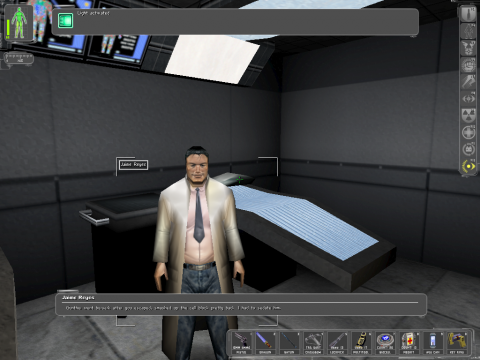
Eidos Interactive tried to revive the franchise. Crystal Dynamics was working on a third entry, Deus Ex: Clan Wars, which was eventually released without the Deus Ex narrative hooks as Project: Snowblind. The combat attempted to harness Deus Ex's revered sense of player agency.
For the past four years, Dugas has been working on what was once Deus Ex 3 and became Deus Ex: Human Revolution, a sequel that's actually a prequel. A prequel gave him leeway to play within the Deus Ex universe without having to push forward story implications of Invisible War.
Invisible War was released in late 2003. It's been almost eight years since the last Deus Ex game. Anticipation for the game was all over the place.
The response has been hugely positive. It's probably my favorite game this year, praise I do not give easily, as I'd written the series off after Invisible War. I begrudgingly accepted the idea of a non-Warren Spector lead Deus Ex, but many hours later, I was in love.
"Where I'm the most at peace...often times, people have super high expectations, it's easy to fall short of those expectations," said Dugas. "Globally, it seems like, for the most part, we have met or surprised those expectations. For me, it was a huge relief and I was super happy because we spent a lot of time on that game and we were really dedicated and we put a lot of energy and effort in that, so getting that kind of feedback is really exciting. I'm in a good place in my head right now."
Part of what makes Human Revolution feel so different is how old school it feels. In some respects, it feels like an active rejection of modern, focused tested game design, which often struggles to offer true choices and consequence. If a player isn't having fun every second, is the game doing its job correctly? This has stamped out much of gaming's biggest taking too many risks, streamlining adventures to the point where the term "rollercoaster" probably means "scripted, linear experience."
That's not Deus Ex.
"I always wanted it to lower the level of intimidation as much as possible," he said, "whether it's in the control department or trying to evolve the mechanics and things like that, but I always said that I never wanted to compromise the depth and layers of what the Deus Ex experience was."
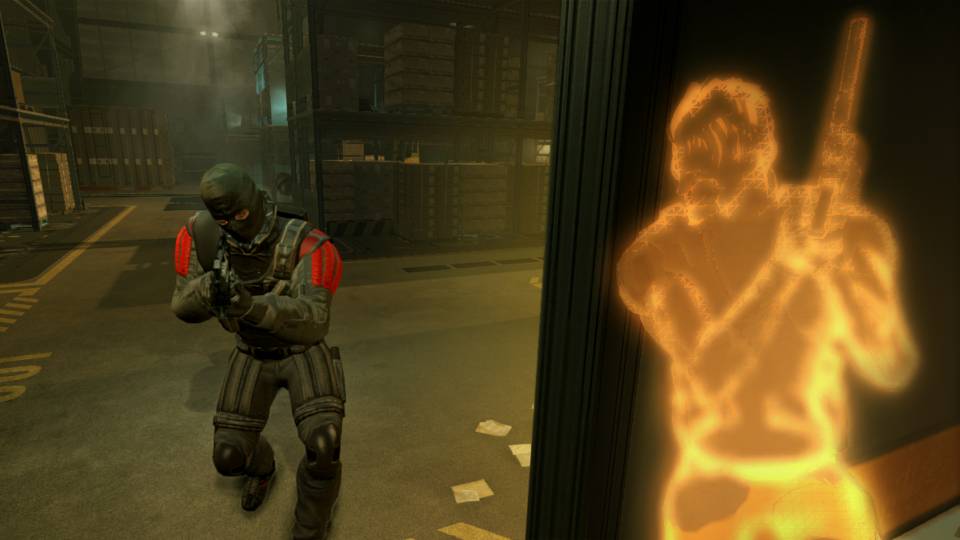
"It's always been our vision, so with the publisher [Square Enix], early on, that's what we were saying," he continued. "We wanted to respect the intelligence of the players. People are not that stupid, and we need to respect that."
You make choices all the time in Human Revolution, whether it's to clear a room with tranquilizer darts, spamming grenades, sneaking through via augmentations or blazing in with a shotgun in hand. And that's just what's happening in the combat; there's a surprisingly deep conversation system, too. One thing the game doesn't do until the very end, however, is make a judgement call on your actions. Your decisions are simply decisions, they don't inform a morality meter on a status screen.
The team did throw around the idea of having a visible morality meter but it didn't last very long.
"I'm more attracted to choices where it's more about your own ethics, your own morality and your response to that," said Dugas. "The [idea of] clear-cut morality [is something] we threw it out of the window very early on of the development cycle. We just moved forward with what we thought would be more engaging on an experience level, as opposed to a gameplay level."
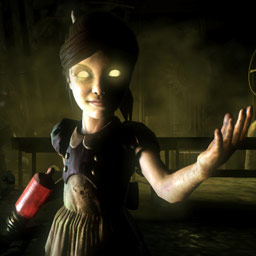
By "on a gameplay level," Dugas pointed towards games where players make decisions based on how they influence character progression, weapons and status. In BioShock, for example, players are asked to sacrifice or save the Little Sisters. If you sacrifice them, you gain more points to allocate towards powers than if you chose to save them. When Dugas plays games like this, he tends to make his decisions based on what will benefit him most as a player, not what he would do as a person.
There's a reason these feelings are swirling around. Soon, Dugas will be turning 40-years-old.
"As I get older," he said, "I'm more compelled to more meaningful stuff, than just the purely entertaining stuff."
You know...like ladders. And vents. Or vents and ladders.
Climbing ladders and crawling through vents remains the most common way of getting around--a Deus Ex staple. It's pretty ridiculous. Find a stack of boxes, there's gonna be a vent. Not sure how to scale a building? Look for the friendly, nearby ladder! When I asked Dugas how his team determined the future of mankind would deal with so many vents and ladders, he burst into laughter.
"Good question!" he coughed, as he worked to compose himself.
"One aspect where we kind of didn't have the time to spend more time in thinking it more through were those alternate paths with vents and ladders and stuff like that," he admitted. "It's something that if we were to revisit making that kind of game, it's something that would be different."
He alluded to the frankenstein nature of game development as a stumbling block, where systems and tech are constantly evolving and you suddenly have to make the best out of what you have. Here, ladders and vents helped stitch things together.
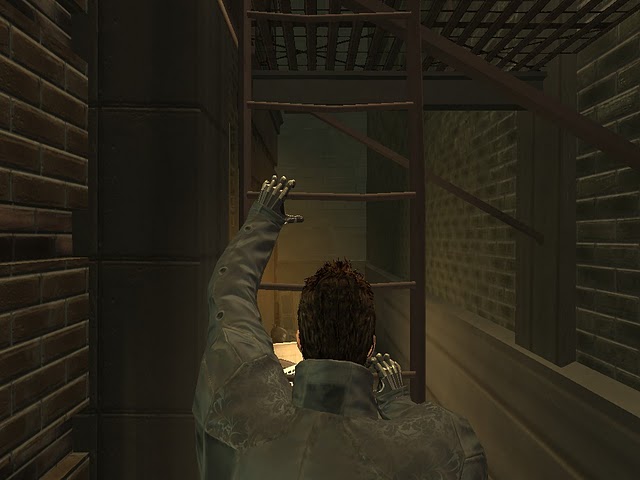
In response to that comment, cue complaints about the game's controversial boss battles. Dugas adopted a very serious tone when I asked about the fan reaction to the inconsistent nature of the boss battles. The one-on-one confrontations shifted the game to a very action-oriented style of gameplay that didn't work for every character type (read: my stealth dude).
The situation flared up even hotter when the Internet discovered Eidos Montreal had not created the boss battles themselves; they were outsourced to another development studio named Grip Entertainment. Our interview was conducted as fans were reacting to the news about Grip, so this was fresh in his mind.
"The last few days we've seen a lot of people flacking the company Grip that worked with us on the boss fights and 'Ohhhh, now we understand why those boss fights aren't on par with the rest of the game, it's because they outsourced it.' The truth is that it has nothing to do with that," said Dugas. "We worked with Grip. and Grip did an excellent job in the confines of what they were asked to do."
Dugas did not excuse the boss fights. Rather, he acknowledged the issue, and said his team realized the problem too late in development to make any sweeping changes. Eidos Montreal had built key plot points into the fights, so ripping them out of the game was out of the question, so the primary objective became to make sure the boss fights weren't frustrating.
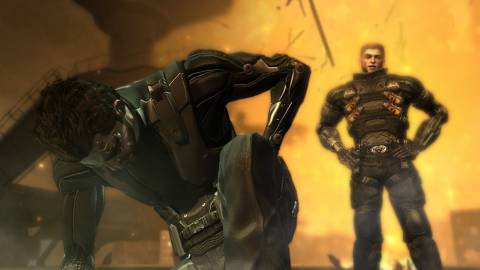
"At some point, we were wrestling kind of bit with some of the features and the right amount of time and right amount of resources to work on those systems," he said.
The confused reaction is not what surprised Dugas but the outright frustration. Dugas claimed internal playtesting, which he credits improving many aspects of Human Revolution, didn't raise a red flag here.
"With the boss fights, this is the place where there was a disconnect where what we experienced during the playtest and what we experienced with the game being released," he said.
Dugas has chalked the response as a lesson learned.
Where Dugas will apply those lessons is a good question, too, though one we didn't mull over much during our conversation. Not long after Human Revolution shipped, Square Enix's said it's doubling the size of Eidos Montreal, signaling the publisher's happy. Combined with a sneaky epilogue, a sequel is all but assured, even if Dugas is unsurprisingly noncommittal.
Eidos Montreal is also making Thief 4, which finds the studio again resurrecting another beloved but dormant franchise.
"It [was] our goal to revive a Deus Ex experience, and that's what we did," he said.
I had to ask one last question before hanging up, though. As per tradition, Human Revolution offers a variety of options for how the game can end during a critical moment. If given a single option, I wondered which one Dugas would have picked.
You'll have to click below to find out.